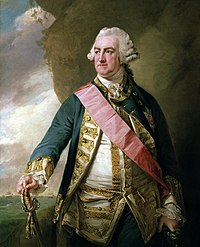Admiral Hawke
|
The Right Honourable The Lord Hawke KB, PC |
|
|---|---|

Edward, Lord Hawke
|
|
| First Lord of the Admiralty | |
|
In office 1766–1771 |
|
| Prime Minister |
Lord Chatham Duke of Grafton Lord North |
| Preceded by | Sir Charles Saunders |
| Succeeded by | Lord Sandwich |
| Personal details | |
| Born |
21 February 1705 London, England |
| Died | 17 October 1781 (aged 76) Sunbury-on-Thames, England |
| Resting place | St. Nicolas' Church, North Stoneham, Hampshire, England |
| Profession | Admiral, |
| Military service | |
| Allegiance |
|
| Service/branch |
|
| Years of service | 1720–1781 |
| Rank | Admiral of the Fleet |
| Commands |
HMS Wolf HMS Flamborough HMS Portland HMS Berwick HMS Neptune Western Squadron Commander-in-Chief, Portsmouth |
| Battles/wars |
War of the Austrian Succession Seven Years' War |
Admiral of the Fleet Edward Hawke, 1st Baron Hawke, KB, PC (21 February 1705 – 17 October 1781) was a Royal Navy officer. As captain of the third-rate HMS Berwick he took part in the Battle of Toulon in February 1744 during the War of the Austrian Succession. He also captured six ships of a French squadron in the Bay of Biscay in the Second Battle of Cape Finisterre in October 1747.
Hawke went on to achieve a victory over a French fleet at the Battle of Quiberon Bay in November 1759 during the Seven Years' War, preventing a French invasion of Britain. He developed the concept of a Western Squadron, keeping an almost continuous blockade of the French coast throughout the war.
Hawke also sat in the House of Commons from 1747 to 1776 and served as First Lord of the Admiralty for five years between 1766 and 1771. In this post, he was successful in bringing the navy's spending under control and also oversaw the mobilisation of the navy during the Falklands Crisis in 1770.
Born the only son of Edward Hawke, a barrister at Lincoln's Inn, and Elizabeth Hawke (née Bladen), Hawke benefited from the patronage of Colonel Martin Bladen a Member of Parliament, who was his maternal uncle. Hawke joined the navy as a volunteer in the sixth-rate HMS Seahorse on the North American Station in February 1720. Promoted to lieutenant on 2 June 1725, he transferred to the fifth-rate HMS Kingsale on the West Coast of Africa later that month, to the fourth-rate HMS Portland in the Channel Squadron in April 1729 and to the fourth-rate HMS Leopard in November 1729. After that he moved to the fourth-rate HMS Edinburgh in the Mediterranean Fleet in May 1731, to the sixth-rate HMS Scarborough in January 1732 and to the fourth-rate HMS Kingston, flagship of Commodore Sir Chaloner Ogle, Commander-in-Chief of the Jamaica Station, in December 1732.
...
Wikipedia
